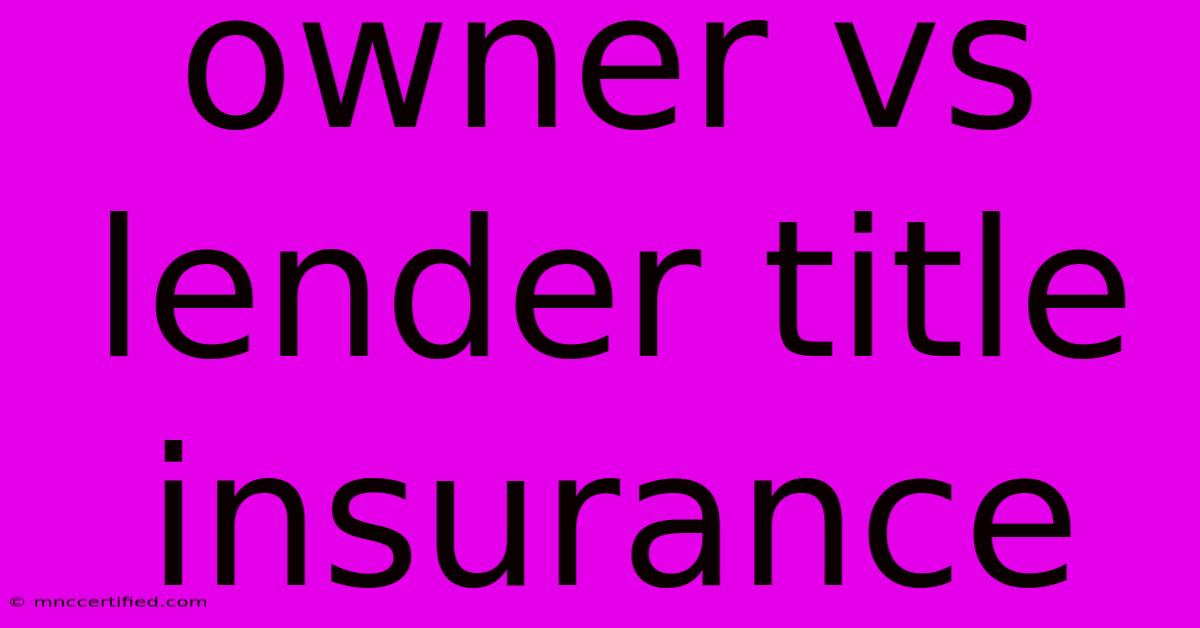Owner Vs Lender Title Insurance

Table of Contents
Owner vs. Lender Title Insurance: What's the Difference?
Buying a home is a significant investment, and protecting that investment is paramount. Title insurance plays a crucial role in this process, safeguarding you from potential financial losses due to title defects. However, there are two distinct types of title insurance: owner's title insurance and lender's title insurance. Understanding the differences between these two is vital for any homeowner.
Understanding Title Insurance: A Foundation
Before diving into the specifics, let's establish a basic understanding of what title insurance actually is. Title insurance protects you against financial losses stemming from problems with the ownership of your property. These problems, known as title defects, can include things like:
- Forged deeds: A previous owner fraudulently transferred ownership.
- Unpaid taxes or liens: Outstanding debts attached to the property.
- Encroachments: Structures built on neighboring property.
- Mistakes in public records: Errors in the official land records.
Essentially, title insurance acts as a safety net, ensuring your ownership is clear and free from unexpected legal challenges.
Owner's Title Insurance: Protecting Your Investment
Owner's title insurance protects you, the homeowner, against financial losses caused by title defects that existed before you purchased the property. This coverage is for the lifetime of your ownership and is typically a one-time premium payment at closing.
Key Benefits of Owner's Title Insurance:
- Peace of mind: Knowing your investment is protected from unforeseen title issues provides significant reassurance.
- Long-term protection: The coverage lasts as long as you own the property, transferring to future owners if you sell.
- Financial security: It protects your equity and prevents potentially devastating financial losses from title disputes.
- Covers a broad range of issues: From forged documents to boundary disputes, it offers comprehensive protection.
Why you need Owner's Title Insurance: Even with a thorough title search, some defects can be missed. Owner's title insurance provides a crucial backup, protecting your significant investment for years to come. It's a worthwhile expense to ensure the long-term security of your home.
Lender's Title Insurance: Protecting the Lender
Lender's title insurance, on the other hand, protects the lender (your mortgage company) against financial losses from title defects. It safeguards their investment in your mortgage. The lender requires this insurance to protect their financial interest in the property.
Key Differences from Owner's Title Insurance:
- Protects the lender, not the homeowner: The primary beneficiary is the mortgage company, not you.
- Coverage expires upon loan payoff: Once you pay off your mortgage, the lender's coverage terminates.
- Typically a one-time premium: Similar to owner's title insurance, it's usually a one-time payment at closing.
- Focus on the lender's financial stake: It's primarily concerned with ensuring the lender can recover their investment if title issues arise.
Why lenders require Lender's Title Insurance: It mitigates their risk, ensuring they can recoup their investment should title problems emerge that affect the property's value or ownership.
Owner vs. Lender: A Side-by-Side Comparison
| Feature | Owner's Title Insurance | Lender's Title Insurance |
|---|---|---|
| Who it protects | Homeowner | Lender (Mortgage Company) |
| Coverage duration | Lifetime of ownership | Until the mortgage is paid off |
| Primary purpose | Protect homeowner's investment | Protect lender's investment |
| Premium payment | One-time payment at closing | One-time payment at closing |
| Transferability | Transfers to new owners upon sale | Does not transfer |
Frequently Asked Questions (FAQs)
Q: Is owner's title insurance required? While not always legally mandated, it's highly recommended and provides crucial protection for your investment.
Q: Can I choose different title insurance companies? Usually, yes. You can inquire about different providers and compare rates.
Q: What happens if a title defect is discovered after closing? Your title insurance company will handle the legal process to resolve the issue, protecting your financial interests.
Q: How much does title insurance cost? The cost varies depending on the property's value and location.
Understanding the nuances between owner's and lender's title insurance is essential for every homeowner. While lender's title insurance primarily benefits the mortgage company, owner's title insurance is your shield against unexpected title problems, safeguarding your hard-earned investment for years to come. Don't underestimate the value of this crucial protection. Contact a title insurance professional for a more detailed explanation tailored to your specific needs and location.

Thank you for visiting our website wich cover about Owner Vs Lender Title Insurance. We hope the information provided has been useful to you. Feel free to contact us if you have any questions or need further assistance. See you next time and dont miss to bookmark.
Featured Posts
-
Is Swift Coin A Good Investment
Nov 23, 2024
-
Stoughton Police Find Missing Kids
Nov 23, 2024
-
Cher Critiques Bogdanovichs Mask
Nov 23, 2024
-
A List Star Snubs Saturday Kitchen
Nov 23, 2024
-
Agriculture Secretary Loeffler A Top Contender
Nov 23, 2024